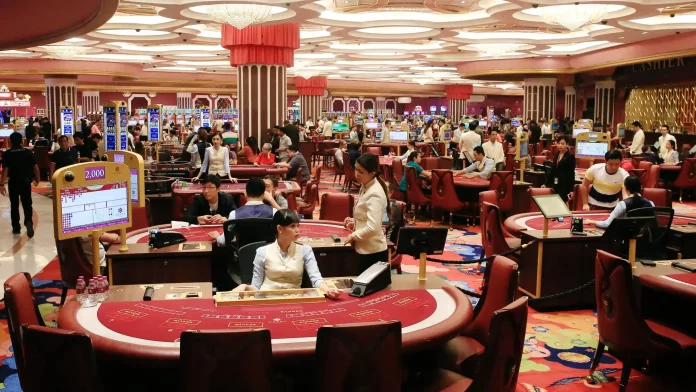An academic study has uncovered that while the majority of frontline casino employees in Macau possess a clear understanding of responsible gambling, they encounter a series of challenges that hinder their ability to effectively intervene in problematic gaming behaviors.
The study, conducted by the Centre for Gaming and Tourism Studies at Macao Polytechnic University, concludes that ‘most frontline casino employees understand responsible gambling clearly, but a few employees have significant cognitive biases. Employees are generally able to identify problems but rarely proactively intervene in problem gambling behavior.’
The study also finds that ‘role ambiguity and conflict, fear of offending clients or getting themselves into trouble, fear of misidentification, and lack of support, guidance, or knowledge were the main barriers preventing staff from proactively intervening in problem gambling behavior.’
The authors of the study are Manian Wongkun and Liu Shuang, both scholars from the Centre for Gaming and Tourism Studies at Macao Polytechnic University.


The study used semi-structured questions to conduct multiple rounds of interviews with 49 frontline casino employees from 6 gaming companies in Macau. The study, titled “The Perceptions and Practical Dilemmas of Responsible Gambling Faced by Frontline Casino Employees in Macao”, was published in Global Gaming & Tourism Research, an academic publication of Macao Polytechnic University.
“The study concluded that the problem of problem gambling has not been significantly reduced.”
Non-resident gamblers
The study indicates that many employees still believe that Macau’s responsible gaming plan only applies to local residents and casino employees, and does not include tourists. The majority of Macau’s gaming revenue comes from mainland tourists, followed by Hong Kong residents. It can be inferred that problematic gambling may be more common among overseas gamblers.
Although the Macau government has established a Responsible Gambling Working Group since 2009 to coordinate and promote responsible gaming policies in Macau, most promotion activities are concentrated in areas where Macau residents gather, including mobile applications and other networks. Most forms of promotion are aimed at Macau residents.
‘The responsible gambling information that foreign gamblers are exposed to may be limited to a few signs inside the casino and leaflets at responsible gambling promotion booths. Therefore, the main group of problem gamblers — Mainland gamblers — may not have received relevant information effectively, which may also have caused a bias in casino employees’ understanding of responsible gambling to a certain extent,’ it concludes.
The scholars mention that twenty years ago, when Macau first liberalized its gambling industry, the city faced a very serious problem gambling situation.
According to the University of Macau’s survey on the gambling behavior of Macau residents (University of Macau Gambling Research Institute, 2003, 2007, 2022), the prevalence of problem gambling among Macau residents increased from 4.28 percent in 2003 to 6.01 percent in 2007, and then declined year by year. However, ‘few studies have specifically analyzed problem gambling among non-resident gamblers in Macau.’
Through on-site observations of frontline employees in Macau casinos, ‘the study concluded that the problem of problem gambling has not been significantly reduced, whether from the perspective of gamblers as a whole or as a group of non-resident gamblers. If not handled properly, the problem could jeopardize the long-term viability of Macau’s gaming industry.’
“Macau can also learn from foreign practices and impose legislative requirements on the industry.”
Macau needs to learn from others
The study suggests that Macau should learn from others, including training for casino employees, as well as legislation.
It notes that some foreign gambling jurisdictions, such as Australia, New Zealand, the Netherlands, and some Swiss states, have legislation requiring the industry to develop corresponding policies, training, and strategies to identify people who may encounter gambling difficulties and provide appropriate assistance.
Therefore, ‘Macau can also learn from foreign practices and impose legislative requirements on the industry. The content of the legislation, implementation standards, clear responsibilities of all parties, and whether casino employees can appropriately intervene with problem gamblers. If not, how to implement it requires extensive and in-depth discussion.’
In this context, gaming scholars believe that continuing to increase responsible gambling training for casino employees, clarifying the intervention responsibilities and scope of relevant parties, and strengthening responsible gambling education for gamblers, especially non-resident gamblers, will help improve Macau’s responsible gambling practices.











